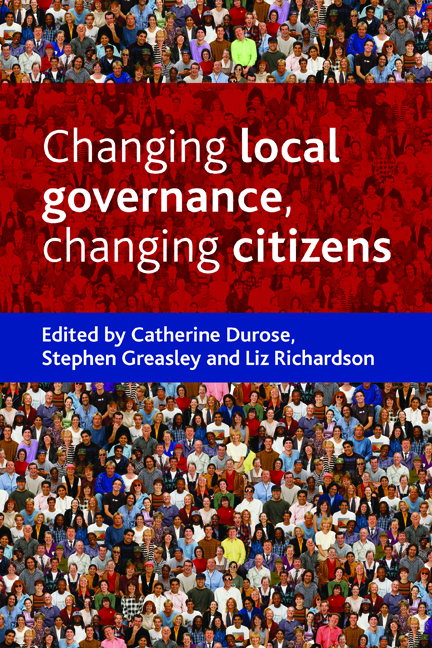Book contents
- Frontmatter
- Dedication
- Contents
- List of boxes and tables
- Acronyms
- Notes on contributors
- Acknowledgments
- Foreword
- Preface
- one Changing local governance, changing citizens: introduction
- two Citizen governance: where it came from, where it’s going
- three ‘Neighbourhood’: a site for policy action, governance … and empowerment?
- four Urban housing market restructuring and the recasting of neighbourhood governance and community
- five Citizen aspirations: women, ethnicity and housing
- six Can we promote cohesion through contact? Intergroup contact and the development of community cohesion
- seven New migrants, citizenship and local governance: ‘Poles’ apart?
- eight Citizens of faith in governance: opportunities, rationales and challenges
- nine Citizens’ reflections on behaviour change policies
- ten Every child’s voice matters?
- eleven e-citizenship: reconstructing the public online
- twelve Conclusion
- Index
eight - Citizens of faith in governance: opportunities, rationales and challenges
Published online by Cambridge University Press: 16 July 2022
- Frontmatter
- Dedication
- Contents
- List of boxes and tables
- Acronyms
- Notes on contributors
- Acknowledgments
- Foreword
- Preface
- one Changing local governance, changing citizens: introduction
- two Citizen governance: where it came from, where it’s going
- three ‘Neighbourhood’: a site for policy action, governance … and empowerment?
- four Urban housing market restructuring and the recasting of neighbourhood governance and community
- five Citizen aspirations: women, ethnicity and housing
- six Can we promote cohesion through contact? Intergroup contact and the development of community cohesion
- seven New migrants, citizenship and local governance: ‘Poles’ apart?
- eight Citizens of faith in governance: opportunities, rationales and challenges
- nine Citizens’ reflections on behaviour change policies
- ten Every child’s voice matters?
- eleven e-citizenship: reconstructing the public online
- twelve Conclusion
- Index
Summary
Introduction
Debates about the role and place of faith in the public realm are re-emerging in light of contestation surrounding the decline of religion predicted by secularisation theses. Indeed there is evidence suggesting that the interface between the state and citizens of faith and their communities is changing and that faith groups are gaining increased influence and prominence in the public domain within, what has been termed, the post-secular society (Habermas, 2006). As part of this, new opportunities for faith participation in the public realm have emerged, particularly from the early 1990s onwards. These include representation on partnership bodies, consultations and the provision by faith-based organisations of state-funded welfare services and programmes aimed at facilitating community cohesion. Such opportunities have emerged in the context of broader UK government agendas towards partnership, democratic renewal and community empowerment. This, together with concerns over polarisation and religious extremism, led the government to declare an intention to work more closely with faith communities and citizens to facilitate community cohesion, active citizenship and good governance, as well as help prevent violent extremism.
This chapter explores the extent to which there has been a renegotiation of state–faith relations in Britain from the early 1990s onwards and discusses the implications and impact of this for local governance structures, processes and actors. The chapter begins with an overview of faith diversity and secularism in Britain, following which new opportunities for faith engagement in local governance are identified. It then explores the implications and impact of this for local governance processes and actors. In doing so, it discusses the rationales, opportunities and challenges surrounding faith engagement, focusing in particular on issues of power and citizenship. The discussion draws on available evidence from primary and secondary sources, including 44 interviews undertaken between 2005 and 2008 with various actors. These include: national faith leaders and civil servants in the Home Office and the Department of Communities and Local Government (CLG); faith leaders and activists from Christian, Muslim, Hindu, Sikh, Jain, Jewish and Bahá’í communities; members of faithbased organisations; and representatives from the wider voluntary and community sector and statutory bodies, including the local authority and constabulary in Leicester.
- Type
- Chapter
- Information
- Changing Local Governance, Changing Citizens , pp. 135 - 156Publisher: Bristol University PressPrint publication year: 2009



